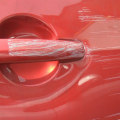Removing paint from a car can be a frustrating and time-consuming task. Whether you accidentally splattered paint while working on a project or discovered unwanted marks on your vehicle, getting rid of it safely is essential to avoid damaging your car’s finish. Fortunately, there are several effective ways to remove paint using common household items—without relying on harsh chemicals that could harm your car’s surface.
One of the simplest methods for removing paint from hard surfaces such as glass is by using a razor blade or utility knife. These tools are perfect for scraping away dry, hardened paint. Before you start, ensure the paint is completely dry and that you’re wearing safety gloves to protect your hands. Secure the razor blade in a holder and carefully scrape away from your body to prevent injury. This method is best suited for glass or other non-painted surfaces where scratching isn’t a concern.
Another surprising but effective method involves mustard. While it might sound unusual, mustard works well for removing paint from bare metal surfaces. However, do not use it on painted areas, as it can strip away the original finish. To use, apply a thick layer of mustard over the paint and allow it to dry completely—this can take up to 24 hours. Once dry, peel it off, and the unwanted paint should come away with it.
If you happen to have silly putty or “silly rope” in the house, it can also help. Apply it directly onto the paint, ensuring that it covers the affected area. After 24 hours, when the putty hardens, peel it off. It will often lift the paint residue cleanly, leaving the surface underneath intact.
For tougher cases, some people turn to brake fluid, which can dissolve paint effectively. However, this method requires extreme caution. Brake fluid can easily damage surrounding painted areas, so only apply it to small, isolated spots using a clean cloth. Gently press the fluid-soaked cloth onto the paint, let it sit for a few minutes, and then rub lightly until the paint starts to lift. Wipe the area clean with a damp cloth afterward to remove any residue.
While home remedies can work, there are plenty of myths about using substances like vinegar or even deli meats such as mortadella slices for paint removal. These methods are ineffective and should be avoided—they won’t remove paint and can create unnecessary mess. Similarly, using products like shaving cream or shoe polish can permanently discolor your vehicle’s paint. Strong chemical strippers, while effective, often remove paint down to bare metal and should be used only when you plan to repaint the car entirely.
Understanding the type of paint you’re dealing with is also important. Oil-based paints typically use linseed oil as a binder and can be removed with mineral spirits—a petroleum-based cleaning liquid. Mixing mineral spirits with vegetable-based turpentine creates an effective solution for removing tough, oil-based paint. Water-based paints, on the other hand, are easier to clean and can often be removed with soap, water, and mild scrubbing. Acrylic paints, which use synthetic binders, may require specialized cleaning solutions or gentle heat application.
If you’re using a heat gun, apply it carefully to the painted area until you see small bubbles form. Then, use a plastic scraper or spatula to lift the loosened paint. Always keep the heat gun moving to avoid overheating the surface, which can cause warping or further damage.
When working indoors or in confined spaces, protect your surroundings by covering the floor with plastic and kraft paper to catch drips and paint flakes. Proper ventilation is also crucial when working with any cleaning agents or heat-based tools.
For paint spills that prove too difficult to remove at home—or for those that occur on delicate or large areas of your vehicle—professional help may be necessary. Auto body specialists have access to advanced tools, gentle solvents, and buffing techniques that can restore your car’s surface without damaging the underlying finish.
Just as maintaining your car’s paint requires attention and care, so does maintaining your property’s outdoor surfaces. Keeping areas like your driveway, roof, or pool deck clean not only enhances curb appeal but also prevents long-term damage from buildup, mildew, and exposure. Homeowners in Central Florida who value exterior maintenance can benefit from quality pool deck cleaning services for Orlando homeowners. Regular professional cleaning not only restores the beauty of your pool area but also helps prevent slippery surfaces and stains caused by algae and dirt accumulation.
In summary, removing paint from your car doesn’t always require harsh chemicals or professional intervention. By using the right household tools and techniques—and by practicing patience and care—you can safely restore your car’s appearance. And for homeowners who want their entire property to look as polished as their vehicle, professional exterior cleaning services can make a world of difference, keeping your home’s outdoor spaces clean, safe, and beautiful year-round.






